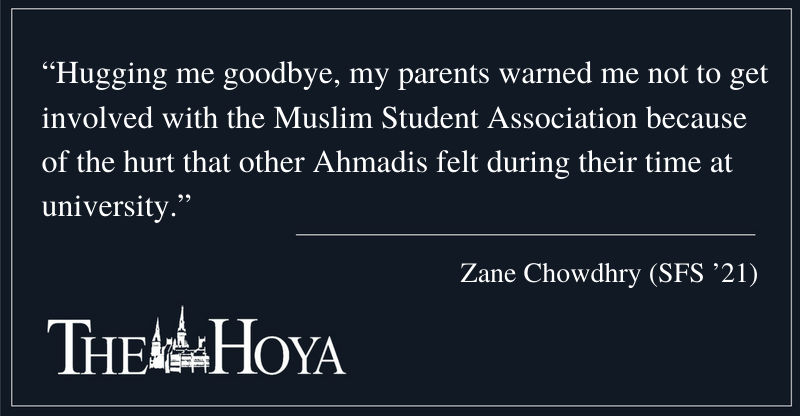In the confines of my home in the suburbs of the Pacific Northwest, some of my earliest memories included learning the basics of Islam. I remember my mother singing me to sleep with zikr, my grandmother patiently teaching me to read the Arabic of the Quran. Yet outside of my home and our mosque, I never knew any other Muslims. My entire understanding of Islam was colored by the carefully manicured image of my loving Muslim community, leaving me unaware of the strife they had endured.
As I grew older, I began to hear stirrings that I was not only different from my elementary school classmates, but also from the “other” Muslims. When I learned about the conflicts between Sunnis and Shias in my world history class, I was confused: I couldn’t classify myself in the presented dichotomy of Islam. I only knew that I was an Ahmadi but I had trouble understanding why I didn’t know any Sunnis or Shias.
Almost all Muslims believe in the advent of the Mehdi, a promised reformer, and the second coming of Jesus, who are prophesied to appear in the latter days of the world by the Prophet Muhammad. As Ahmadis, we believe these prophecies and other aspects of faith are metaphorical and that the Messiah has already appeared in the person of Mirza Ghulam Ahmad of Qadian in the late 19th century.
Ahmad stressed reverence to the pious example of the Prophet Muhammad through personal faith, peace and love. He rejected violent interpretations of religion and instead emphasized defending and spreading the teachings of Islam through logical argumentation and deep study. Yet Ahmad claimed to be a lesser prophet of God and was therefore accused of violating the status of the Prophet Muhammad as “Khatam-un-Nabiyeen” or the “Seal of the Prophets.”
Through mass political movements and propaganda, an amendment to the Pakistani constitution in 1974 declared Ahmadis as “non-Muslims.” In 1984, the government forbade Ahmadis from “posing” as Muslims. As a result, Ahmadis have lost the right to practice Islam. Saudi Arabia and other Muslim nations have followed suit, banning Ahmadis from attending the sacred Islamic pilgrimage, the Hajj.
Throughout middle and high school, I watched members of my religious community on the news murdered, jailed and boycotted because of their faith in Pakistan, Libya and Indonesia. I heard my older cousins talk about how they had been ostracized and verbally abused by Muslim Student Associations in America once their Ahmadiyyat revealed itself. Through internalizing the suffering of my loved ones, I compartmentalized that all other Muslims hated Ahmadis.
When I moved across the country to attend Georgetown University, I ended up matching with another Muslim for a roommate while avoiding mentioning faith at all when interviewing each other. Right before my parents left me after New Student Orientation, my father pulled my roommate’s father aside and admitted what we were to him, as if my identity were a dirty secret that should be shared on a need-to-know basis. My roommate didn’t seem to care but nonetheless had many questions. Hugging me goodbye, my parents warned me not to get involved with the Muslim Student Association because of the hurt that other Ahmadis felt during their time at university.
I initially brushed off claims that the MSA and Muslim Life were for any people who considered themselves Muslim as they presented themselves. I knew at many universities the “except if you’re Ahmadi” clause was implicit in any such claims from accounts of other Ahmadis. However, on the persistence of my roommate, I became majorly involved in Georgetown’s vibrant Muslim community. Our similar value sets, backgrounds and the warm welcome of upperclassmen, despite some initial suspicion, cemented my place in Georgetown’s MSA.
During my freshman year, I was initially energized to teach other Muslims about my community and learn about theirs. But, over time, I became tired of having to constantly explain myself and remove the myriad misconceptions and lies that were fed to older generations. Through the years, I’ve come to accept that Georgetown will never be able to offer me a community that satisfies my spiritual needs like my Ahmadi community. Yet I was able to find a community with common Muslim values that gives me hope that the sectarianism that plagues my parents’ generation can be lessened though deliberate exposure to other traditions. Rather than accept the broken state of intrareligious affairs, my generation can begin to chip away at the lie of inherent conflict between sects.
Zane Chowdhry is a junior in the School of Foreign Service. Interfaith Insights appears online every other Wednesday.














